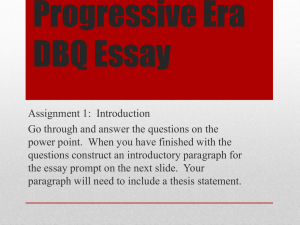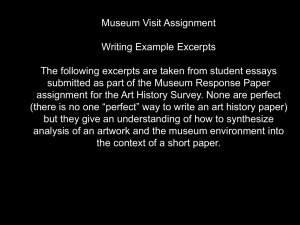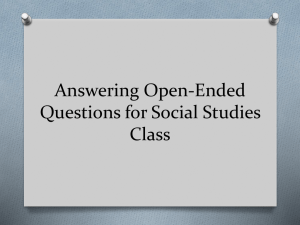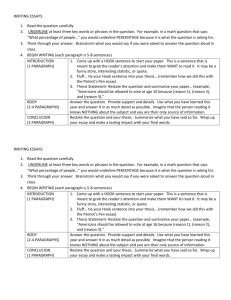1 - Garnet Valley School District
advertisement
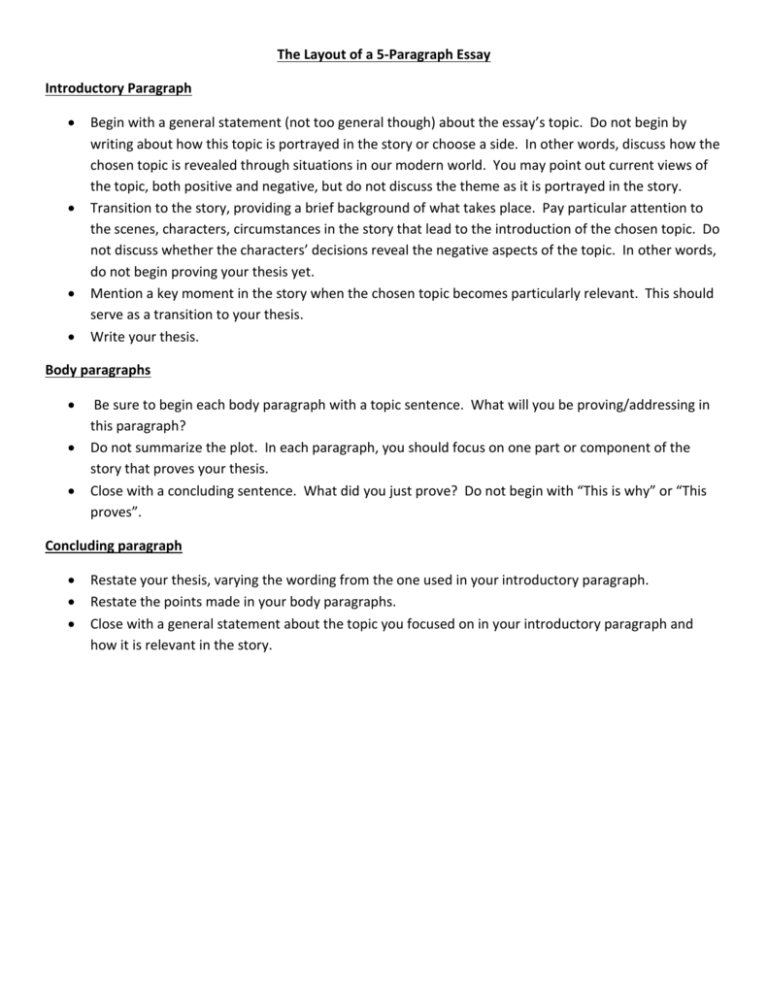
The Layout of a 5-Paragraph Essay Introductory Paragraph Begin with a general statement (not too general though) about the essay’s topic. Do not begin by writing about how this topic is portrayed in the story or choose a side. In other words, discuss how the chosen topic is revealed through situations in our modern world. You may point out current views of the topic, both positive and negative, but do not discuss the theme as it is portrayed in the story. Transition to the story, providing a brief background of what takes place. Pay particular attention to the scenes, characters, circumstances in the story that lead to the introduction of the chosen topic. Do not discuss whether the characters’ decisions reveal the negative aspects of the topic. In other words, do not begin proving your thesis yet. Mention a key moment in the story when the chosen topic becomes particularly relevant. This should serve as a transition to your thesis. Write your thesis. Body paragraphs Be sure to begin each body paragraph with a topic sentence. What will you be proving/addressing in this paragraph? Do not summarize the plot. In each paragraph, you should focus on one part or component of the story that proves your thesis. Close with a concluding sentence. What did you just prove? Do not begin with “This is why” or “This proves”. Concluding paragraph Restate your thesis, varying the wording from the one used in your introductory paragraph. Restate the points made in your body paragraphs. Close with a general statement about the topic you focused on in your introductory paragraph and how it is relevant in the story. 1. “The Bet” Pride is clearly portrayed as destructive in “The Bet.” Examine the nature of pride and how it can harm or assist a person. Then, discuss how it is portrayed in the story. How does it impact the disagreement between the lawyer and banker, as well as the bet itself? How does it affect each of them as story progresses? What does this story reveal about the nature of pride? Thesis Suggestions: * Through the actions of the banker and lawyer and the consequences of those actions, “The Bet” clearly demonstrates the destructive nature of excessive pride. * “The Bet” clearly demonstrates that pride can be extremely destructive when not balanced with reason. Introductory Paragraph Definition of pride: Real-world examples of decisions based on pride and their consequences: Briefly introduce story: Thesis: Body paragraphs Pride, as it leads to the bet itself, as well as the agreed upon terms: Topic Sentence Example: The banker and lawyer first reveal the destructive nature of pride through the bet itself and the extreme terms that each agrees to. Consequences for lawyer: Consequences for banker: Concluding paragraph Restate thesis (vary wording): Sum up each body paragraph argument: 2. “The Pedestrian” Technology is something that is all around us and affects our lives daily. How does Bradbury portray its impact throughout “The Pedestrian”? How is Leonard described? How do the descriptions of both Leonard and the society as a whole, as well as Leonard’s fate, reflect Bradbury’s view of technology? What is Bradbury’s overall view of technology and its potential impact on people? Thesis Suggestion: * “The Pedestrian” clearly demonstrates that excessive technology can lead to the spiritual, emotional, and intellectual downfall of mankind. Introductory Paragraph Real-world examples of technology and positive and negative views: Briefly introduce story: Thesis: Body paragraphs Examples of figurative language (metaphors, similes, symbolism, etc.) that reveals society’s downfall: Topic Sentence Example: Through the use of figurative language, Bradbury effectively illustrates the destructive effects of technology on the citizens’ well-being. Examples of facts and/or behaviors that reveal society’s downfall (contrast with Leonard): Consequence of Leonard’s “defiance” and final climactic scene: Concluding paragraph Restate thesis (vary wording): Sum up each body paragraph argument: 3. “The Possibility of Evil” People can sometimes be too “interested” in the lives of others. People can sometimes be hurtful and neglectful of others’ feelings. How does Shirley Jackson portray these tendencies throughout “The Possibility of Evil”? What is she revealing about human nature through Miss Strangeworth and her behaviors? How is her true nature inconsistent with how she is perceived? Examine how she gains people’s trust, her stated motivation, and the consequence of her desire to be involved in shaping people’s lives. Thesis Suggestion: * Miss Strangeworth in “The Possibility of Evil” illustrates that human beings can be excessively “interested” in the lives of those around them and, at times, insensitive to the feelings of others. Introductory Paragraph Real-world examples of people’s need to know about others’ lives and/or their insensitivity: Briefly introduce story: Thesis: Body paragraphs Examples of Miss Strangeworth’s nosiness/insensitivity, as revealed through interactions with neighbors (perhaps include Miss Strangeworth’s view of herself and role in town here): Topic Sentence Example: Miss Strangeworth’s disingenuous “interest” in her neighbors is revealed through her interactions with her neighbors, as she insensitively probes for information while appearing concerned about their well-being. Examples of Miss Strangeworth’s nosiness/insensitivity, as revealed through private thoughts, letters, etc. (perhaps include Miss Strangeworth’s view of herself and role in town here): Consequence of Miss Strangeworth’s nosiness/insensitivity: Concluding paragraph Restate thesis (vary wording): Sum up each body paragraph argument: 4. “The Possibility of Evil” “Things are often not what they seem.” “If something looks too good to be true, it probably is.” Both of these clichés have been proven true repeatedly throughout human history, and each is illustrated through the character of Miss Adela Strangeworth in “The Possibility of Evil.” Examine how her appearance and actions are inconsistent with her true nature. How is she perceived by her neighbors? Why? Be sure to discuss her interactions with her neighbors, her habits, and her thoughts, as well the consequences of her deception. Thesis Suggestions: * Miss Strangeworth in “The Possibility of Evil” clearly reveals that how people are perceived is often incorrect and designed to hide their true intentions and motives. * Miss Strangeworth in “The Possibility of Evil” illustrates that things are often not what they seem through her actions and appearance, both of which hide her true dark nature. Introductory Paragraph Real-world examples of things that are “not what they seem” or “too good to be true”: Briefly introduce story: Thesis: Body paragraphs Examples of Miss Strangeworth’s interactions with neighbors that don’t represent “the real person,” her view of her role in the town, how she is perceived and why: Topic Sentence Example: Miss Strangeworth’s interaction with her neighbors provides the first example of her devious nature, as she hides her dark nature by appearing concerned about their well-being. Examples of Miss Strangeworth’s appearance and habits that don’t represent “the real person”/her likely view of the need for these habits, appearance, role in the town, etc.: Consequence once “the real person” is found out/what truth is revealed?: Concluding paragraph Restate thesis (vary wording): Sum up each body paragraph argument: 5. “Harrison Bergeron” Competition and the desire to be great have driven mankind to achieve immense progress, something that Kurt Vonnegut was clearly aware of when writing “Harrison Bergeron.” How does Vonnegut illustrate the downside of a society without competition – one consumed with the idea that no one should ever feel inferior? Examine all the primary characters’ behaviors and their lives, as well as the restrictions placed upon the citizens to ensure equality. What is the stated motivation of the society’s leaders? Why is Harrison such a threat to the established way of life, prompting Diana Moon Glampers to react as she does? Thesis Suggestions: * “Harrison Bergeron” demonstrates the dangers of a society in which competition has been eliminated to ensure that no feels “inferior.” * Through “Harrison Bergeron,” Vonnegut clearly illustrates that eliminating competition in order to promote “equality” leads the loss of individuality, free thought, and, ultimately, true happiness. Introductory Paragraph Real-world examples of competition and/or lack of competition and the potential benefits and downside: Briefly introduce story: Thesis: Body paragraphs Examples of how everyone is made to be “equal,” motivation of the leaders, etc.: Topic Sentence Example: Through handicaps, the leaders in “Harrison Bergeron” ensure “equality” and lack of competition, as they strive to guarantee that no one feels inferior. Examples of people’s views on equality, the “best” type of society, their “thinking habits,” etc.: Describe Harrison, why he is a threat, and what happens as a result: Concluding paragraph Restate thesis (vary wording): Sum up each body paragraph argument: 6. “By the Waters of Babylon” The pursuit of knowledge has clearly led man to significant achievement, though some would question what has been lost as man has become more advanced. “By the Waters of Babylon” clearly intends to make the reader consider the potential positive and negative impacts of pursuing knowledge. Examine what John illustrates about human nature, through his desire to push forward despite his father’s warnings and the dangers (both real and perceived) that he must face. How do his discoveries illustrate the story’s theme? How does the decision reached by John and his father after John’s return reinforce Benet’s intended message? Thesis Suggestion * Through John and his discoveries, “By the Waters of Babylon” demonstrates that man is, by nature, driven to pursue knowledge and progress, often with potentially tragic consequences. Introductory Paragraph Real-world examples of man’s pursuit of knowledge/progress and its benefits and the potential downside as well: Briefly introduce story: Thesis: Body paragraphs Warnings and dangers that John ignores, what he willingly faces during his journey, etc.: Topic Sentence Example: John relentlessly pursues knowledge despite repeated warnings and potential dangers during his journey to The Place of the Gods. What John discovers and learns about “gods”: Decision made my John and his father and why: Concluding paragraph Restate thesis (vary wording): Sum up each body paragraph argument:



